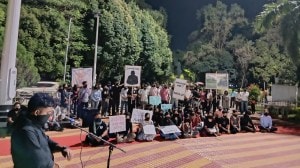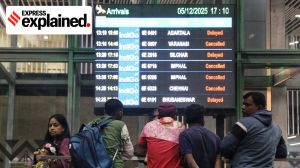Musharraf’s 3-D, our blinkers
President Musharraf has outlined a 3-D package for South Asia: Denuclearisation. De-escalation. Dialogue. Predictably India is not impressed...

President Musharraf has outlined a 3-D package for South Asia: Denuclearisation. De-escalation. Dialogue. Predictably India is not impressed and continues to harp on cross-border terrorism as if the entire responsibility for its predicament in Jammu and Kashmir can be laid at the doorstep of infiltration from Pakistan.
Denuclearisation is a must. Nothing has hurt India’s image internationally these past few weeks than the prospect of an Indo-Pak nuclear skirmish.
Admittedly, irresponsible utterances by Pakistan have contributed to global fears and India has behaved soberly. But that is of little consolation and no help since the damage gets done even if one of the nuclear protagonists indulges in dangerous sabre-rattling.
India’s argument will be that denuclearisation in South Asia is not possible since India faces the Chinese threat as well. In that case, India must engage in trilateral consultations to work out a set of confidence-building agreements that are enforceable and verifiable.
In any case, why not start with Pakistan with which an agreement signed in 1989 not to attack each other’s nuclear installations already exists? At Lahore in February 1999, the Indian Prime Minister and his Pakistani counterpart agreed to start negotiations to conclude a treaty to reduce the risks of nuclear and missile conflict. Those negotiations never took off although considerable technical work was done on both sides.
De-escalation along the border where a million troops belonging to the world’s fourth and fifth largest armies have confronted each other for over six months is equally an urgent necessity. India can certainly maintain a level of mobilisation needed to ensure that the forthcoming elections in Jammu and Kashmir are held peacefully.
But the present level of mobilisation is counter-productive. It may serve to make a few politicians and a few generals feel good. It certainly is not good for the morale of the forces and for the people along the border whose lives have been totally disrupted. India may think that this is an essential element of its policy of coercive diplomacy.
Actually, it is India that is also getting coerced in the process and we have succeeded in internationalising the J&K issue brilliantly.
Dialogue is something that the world is simply not able to understand why India is not sustaining either formally or informally.
Forget the Americans and the Soviets at the height of the Cold War, even the Americans and the Viet Cong kept a diplomatic channel going in Paris as they fiercely battled it out in Vietnam.
Sure, we had Lahore and Agra. But we have still not been able to satisfactorily explain what derailed Agra.
The evidence that it was India that first almost helped take Agra forward and then it was India that sabotaged Agra is too strong to ignore. The argument that India should not have a dialogue unless cross-border terrorism is stopped may apply to summits and high-level political contacts. But why should official-level talks or even Track-II diplomacy come to a standstill?
It may be painful for us to admit but the sad truth is that our current predicament in Jammu and Kashmir. Mistakes by successive governments in Delhi and the incompetence of successive administrations in the state have resulted in the present imbroglio which Pakistan has exploited. Even today, the keys to a turnaround in Jammu and Kashmir within the secular framework of a democratic India lie with the central government.
There is a great feeling of euphoria in the Indian strategic community that India’s hardline stance has paid off with Pakistan having been forced to make many concessions and America having been forced to revise its assumptions on Jammu and Kashmir. Nothing could be more self-delusional than this.
India’s international image as a safe tourist and investment destination has taken a severe knock. South Asia has been elevated in the international perception as an unstable region with an ever-present risk of nuclear conflagration. It is time for us to swallow our pride and respond in a statesmanlike fashion to Musharraf’s 3-D call.Anonymous returns, this time to haunt Indo-Pak ties. The jury is still out on his or her identity. Send your guesses to yourvoiceexpressindia.com
- 01
- 02
- 03
- 04
- 05































